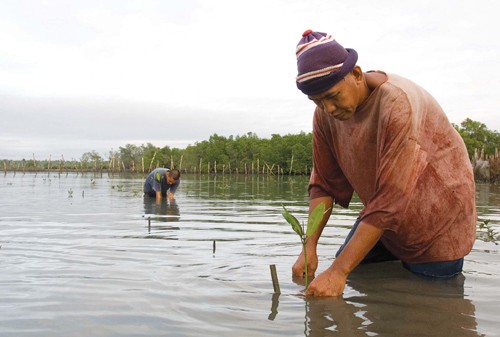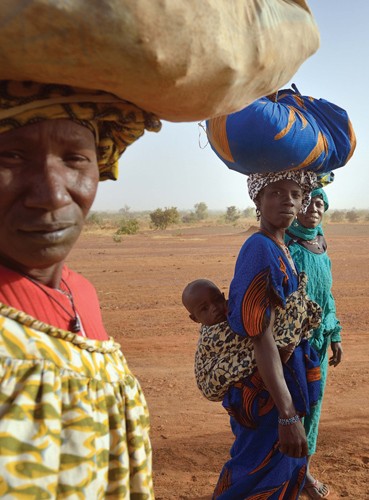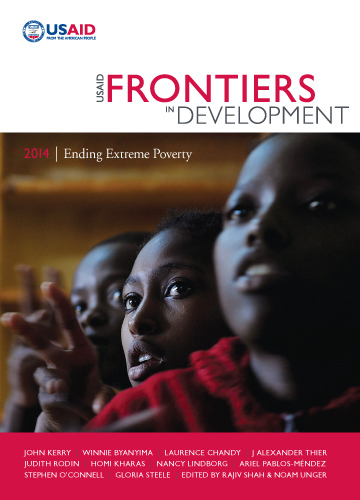John Kerry
So much of human history, and America’s story, has been defined by pioneers: by people who push all accepted boundaries in search of a better life for themselves and for their communities. By casting off the familiar, by always asking “why?” and “what can we do better?”, these remarkable innovators extend our imagination beyond the current frontier.

That same spirit has always defined America’s approach to diplomacy and development as we look to spur progress in the world around us. We looked to the future when we partnered with our European allies to rebuild a continent ravaged by war, led the fight against diseases like polio at home and abroad, and galvanized a global effort to confront the HIV/AIDS pandemic. We have achieved key successes in these endeavors, not by accepting the status quo, but by having the courage to take smart risks, embrace partnerships across the globe, and apply new thinking to the world’s challenges.
Today, we confront another transformative moment, a new frontier in global development. Networks of interconnection are replacing hierarchies of power. Old economic and political structures are becoming both more diffuse and more fragmented. Emerging and developing markets are increasingly important contributors to global growth and to our shared political decision-making.
Lower-income countries are growing their private and public sectors faster than many advanced economies, and are bringing deep expertise to the global stage. At the same time, we face a changing climate that is already causing impacts which threaten some of the development gains we have made in the last 30 years. Our economies, food supply, health, oceans and forests will continue to face increasingly devastating impacts if the pace of rising temperatures is not slowed, and our ability to respond is not strengthened.
This transformation can be seen across sub-Saharan Africa, which is now home to seven of the world’s 10 fastest-growing economies. It’s demonstrated by the dramatic increase in private capital flows, which are now approximately three times the size of assistance flows from the United States to developing countries. As a result, assistance represents 13 percent of flows from developed to developing nations compared to 70 percent 40 years ago. But the picture is very uneven. To be sure, persistent pockets of poverty remain, particularly in the lowest-income and most fragile countries, to which little trade, investment or remittances go. And as the climate changes, those in poverty are the least resilient to its consequences.
Our future prosperity and security are determined by factors beyond military might: the ingenuity of our innovators, the discoveries of our scientists, and the compassion of our spirit.
The time is ripe for reinventing development through new partnerships that address our common challenges and our common interest in achieving inclusive economic growth. Rapid growth occurring in the same countries and regions that suffer from extreme poverty challenges us to rethink how we provide development investments. And no investment can ignore the risks associated with climate change, nor the benefits to economies if we tackle this problem soon. We must see our efforts not as operating in a vacuum, but as part of an ecosystem with diverse partners striving to achieve mutually reinforcing goals. We need to take our greatest assets—America’s culture of innovation, the resilience of our private sector, and our international reach—and strengthen partnerships across the global community to achieve shared priorities.
The New Frontier in Development
President Obama’s 2010 Policy Directive on Global Development made significant strides in launching this transformation. Over the past four years, we’ve streamlined and fine-tuned our approach across the entire spectrum of our development efforts. Forging a stronger framework for development has meant investing in our partners in new ways, and investing in our people and the institutions that support them. Across the State Department and USAID, we have emphasized the importance of better linking together diplomacy and development, and are fostering innovation, including through the new U.S. Global Development Lab. We are better synchronizing investments with partner nations and the private sector, and we are deploying the full range of development tools to enable our partners to succeed, including USAID grants, Millennium Challenge Corporation Compacts, Overseas Private Investment Corporation investments, and Treasury investments in the Multilateral Development Banks.
Despite such efforts, threats to global security, prosperity and environmental sustainability remain. Smart development decisions and approaches today could build resilience and mitigate some of the most critical risks: rampant inequality, poor governance and resource scarcity. Meeting these challenges demands having an agenda for development that puts four issues at its center: driving inclusive economic growth and ending extreme poverty; sustainability and addressing the impact of climate change; achieving gender equality and empowering all women and girls; and elevating the use of data.
Inclusive Economic Growth and Ending Poverty
For the first time in history, the world has the opportunity and potential to eliminate extreme poverty by 2030 through inclusive, global economic growth. To achieve sustainable economic growth and lift countries out of dependence on assistance, we must continue to support countries that want to build a strong environment for trade, catalyze investments, and place a particular emphasis on Africa, where growth is strong but market knowledge and the ability of outside businesses to assess and manage risk can be limited. Investing in the foundations of growth, in basic needs like food security and health, is equally critical.
Trade and investment hold the potential to fuel economic growth while reducing poverty and promoting jobs. Though trade and investment alone cannot solve every development challenge, they are necessary tools in any successful and sustainable development strategy. The African Growth and Opportunity Act, for instance, is helping build a bridge from aid to trade in African countries as their economies grow. Similarly, investments in infrastructure and markets are critical to building economies, presenting opportunities for companies today, and expanding our range of economic partners in the future. For instance, I presided over the signing of a groundbreaking new compact with Ghana this past August, at the U.S.-Africa Leaders Summit, that will enable large-scale public and private investment in power, including renewable energy.
Over the past decade, the United States has made its most significant assistance investments in one of the most important enablers of economic growth: a healthy population. Economic growth and health are inextricably linked. As the recent Lancet Commission found, the returns on investment in global health are even greater than previously understood, with an estimated return of between $9 and $20 by 2035 for every one dollar invested. Through a focus on results, the U.S. President’s Emergency Plan for AIDS Relief (PEPFAR) has turned the tide on the HIV/AIDS epidemic, placing more than 6.7 million people on lifesaving antiretroviral treatment. To achieve an AIDS-free generation and dramatically reduce maternal and child deaths, we are forging new partnerships built on mutual accountability. These investments not only save lives, but are enabling economic growth by increasing the lifespan of adults during their most productive years.
Food security is another essential foundation for economic growth. Alleviating global hunger is not just a priority: It is a moral, economic and national security imperative. The United Nations estimates that over 840 million people, or one in eight, suffer from chronic hunger. Success in food security means helping farmers grow more crops and improving nutrition. For example, under the president’s global food security initiative, Feed the Future, the United States places special emphasis on improved nutrition during the 1,000 days from a woman’s pregnancy to her child’s second birthday. Better nutrition during that window impacts a child’s lifetime health, development and future economic earnings—and her or his country’s future economic growth.
Sustainability and Addressing Climate Change
We know that the most vulnerable and least developed countries are also the most at risk from environmental degradation and the impacts of climate change. Shared prosperity is only possible if we grow more sustainably, mitigate greenhouse gas emissions, adapt to the impacts of global climate change, and improve our management of natural resources. Just as inclusive economic growth, food security, and health are interrelated, so too are these fundamental development issues interconnected with environmental sustainability.
Success at taking on climate change requires working with the private sector to catalyze investments that generate positive returns while contributing to a more sustainable planet. For instance, as part of the president’s bold Power Africa Initiative, we are working with programs such as the U.S.-Africa Clean Energy Finance Initiative, which is leveraging a small investment of public resources to fund early development costs of clean energy initiatives, which in turn catalyze over $1 billion in clean energy investment from the private sector. Private sector commitments also hold the potential to stem the rapid deforestation occurring in some nations, which is destroying valuable carbon sinks. The Tropical Forest Alliance 2020 has brought together the private sector to reduce the deforestation that comes from sourcing palm oil, soy, beef, paper and pulp in developing nations. As part of this alliance, large companies have made voluntary commitments to avoid net deforestation as they cultivate and bring their resources to market.

We are also focusing on the need to protect oceans, which are critical to the nutrition and livelihood of so many people around the world. More than 3 billion people, many of whom live in the least developed countries, rely on food from the ocean as a significant source of protein. To protect the declining health of ocean and coastal ecosystems, we are prioritizing efforts to end overfishing and to prevent illegal, unreported, and unregulated fishing, which ensures long-term sustainability of the fisheries that are so important to food security. Climate change is also causing ocean acidification around the world which is destroying crustaceans, including the smallest ones which are a critical building block of ocean life and productivity. In June 2014, the State Department’s first “Our Ocean” conference, raised commitments from government and private sources valued at more than $800 million to conserve the ocean and its resources for future generations.
The world’s important development gains will not be maintained without addressing climate change and promoting a healthy environment. We must respond to and prevent the negative impacts of climate change that are facing us all. However, these challenges also present new opportunities to build partnerships and collaborative solutions that will foster more sustainable relationships between people and our planet.
Achieving Gender Equality and Empowering All Women and Girls
When women and girls are empowered, educated and equipped to contribute to society, their families, communities and countries are stronger, more stable and more prosperous. That is why we are placing an unprecedented focus on promoting gender equality and advancing the status of women and girls around the world—making the full participation of women and girls in the political, economic and social lives of their countries a key goal of U.S. foreign policy.
In addition to focusing on gender through our diplomatic and policy priorities globally, our development investments focus on integrating the empowerment of women and girls and promotion of gender equality across all sectors. Critical to this effort is our adoption of a more data-driven approach to where and how we allocate resources. Through PEPFAR investments, for instance, data disaggregated by age, sex and geography helps us to target and tailor our efforts, which includes addressing the disproportionate burden of HIV borne by women and girls.
Our work is far from done. Inequality, poverty, discrimination and gender-based violence, including the harmful practices of female genital mutilation/cutting and child, early and forced marriage, have been an accepted reality for far too long. Yet, by boosting women’s economic and political participation and engagement in building peace and security; addressing the pervasive problem of gender-based violence; and investing in the future of adolescent girls, we will see results. Our vision for a peaceful and prosperous global future depends on it.
Elevating the Use of Data
Central to the new development landscape is a demand for transparency, accountability and data-driven decision-making. The United States is adopting a more data-driven approach to allocating resources, working with partners and sharing information with citizens. Tools like the Women’s Empowerment Agricultural Index measure progress and help all actors understand how to focus resources and respond to a changing world. Data is not just an opportunity for better, faster information, but also an opportunity to transform the citizen-government relationship. Real-time data and feedback help citizens make informed decisions to improve their communities and ensure government is responsive to their needs. Integrating the use of data across development, and making the information available to the public, helps programs be more effective and reach more people. We are publicly releasing more data on our development programs and funding through ForeignAssistance.gov and the Development Experience Clearinghouse, and reporting it to the International Aid Transparency Initiative. We are also piloting and expanding innovative approaches to gathering data through social media, geospatial mapping and mobile phones like the mFish Partnership, which uses mobile technology to collect and analyze data on illegal fishing, stop it at the source, and trace seafood along supply chains. These programs are more than just data collection; they allow the local communities to be engaged and contribute to the success of a development program, and serve to create long-lasting partnerships abroad.
Looking Ahead to the Next Generation
The selection of a new generation of development goals known as the post-2015 Development Agenda, the successor framework to the Millennium Development Goals (MDGs), presents a unique opportunity for the United States and its partners. A well-crafted set of goals will enable governments, civil society, the private sector and individual citizens to synchronize efforts to address the most pressing problems the world faces in the coming decades. With a strong focus on ending extreme poverty and tackling the unfinished business of the MDGs, this agenda should promote inclusive economic growth, integrate sustainability and climate change, and empower women and girls.
Agreement on a strong set of new goals will commit world leaders to work in partnership to address common challenges. Whether we are investing in clean energy, fighting disease, building infrastructure, protecting our oceans or promoting greater food security, our objective is to make our partners self-reliant by listening to their priorities and building enduring economic partnerships.
Above all, working in true partnership toward common goals will build the opportunities that the next generation of young people demand everywhere—good education and job opportunities, access to health care, institutions they can trust, freedom from discrimination and a healthy planet. These young people stand at the edge of the new global frontier, and are eager to develop a more sustainable and inclusive world for everyone in it. The expectations and potential of the next generation are high, as is our duty to work together to leave them a better future.
United States Secretary of State John Kerry
Frontiers in Development
Ending Extreme Poverty








Comment
Make a general inquiry or suggest an improvement.